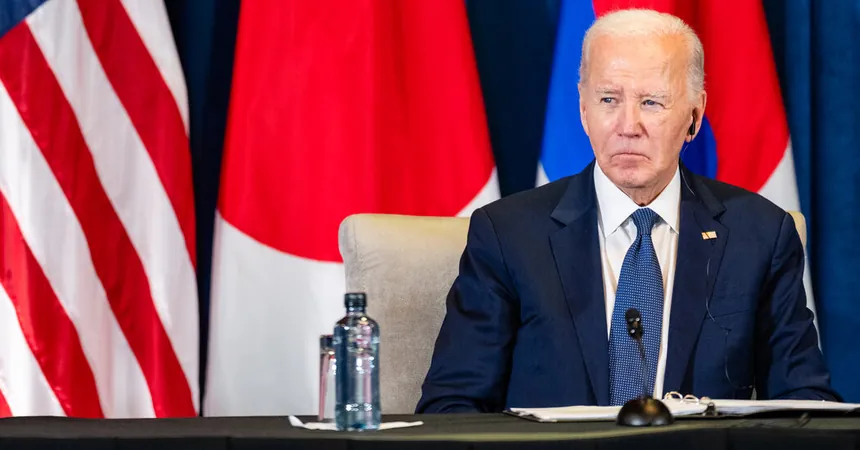
Biden Voices Alarm Over Growing North Korea-Russia Alliance Amid Global Summit
2024-11-16
Author: Ling
Biden Voices Alarm Over Growing North Korea-Russia Alliance Amid Global Summit
In a significant discussion during the Asia Pacific leaders summit held in Peru, President Biden raised serious alarms about what he termed the "dangerous and destabilizing cooperation" between North Korea and Russia. Meeting with Japanese Prime Minister Shigeru Ishiba and South Korean President Yoon Suk Yeol, the trio condemned the burgeoning military ties and the recent decision by North Korea to send thousands of troops to support President Putin’s war efforts in Ukraine.
In their joint statement, the leaders emphasized the severity of this alliance, particularly highlighting the transfer of munitions and ballistic missiles between the two nations. "The deepening military cooperation between the DPRK and Russia is particularly egregious given Russia’s status as a Permanent Member of the U.N. Security Council," they stated. The leaders reaffirmed their unwavering support for Ukraine’s right to self-defense as outlined in Article 51 of the U.N. Charter.
The issue of North Korea-Russia cooperation dominated a closed-door 40-minute session, with a senior American official, speaking anonymously, reflecting the gravity of the discussions. The Biden administration has expressed growing unease over Kim Jong Un’s actions, including troop deployments to Russia and the resumption of long-range ballistic missile tests.
In light of these developments, Biden emphasized the necessity for tight coordination with allies in the region. He expressed optimism about the security and economic partnerships fostered during last year’s Camp David summit. "I am proud to have helped be one of the parts of building this partnership," he said, while simultaneously noting that this meeting might be his last with this specific group of leaders.
The potential return of Donald Trump to the White House was notably absent from the discussions, reflecting the administration’s focus on immediate concerns rather than speculating on future U.S. foreign policy changes under a potential Trump administration. As Biden prepared for his final foreign trip before his term ends, he remarked, "we’ve now reached a moment of significant political change."
National Security Adviser Jake Sullivan indicated that the U.S., Japan, and South Korea are committed to making their cooperation a lasting feature of American policy in the Indo-Pacific. This strategy includes the establishment of a "secretariat" to solidify their security and economic arrangements, with expectations for bipartisan support that could persist under future administrations.
Biden's Camp David summit last year was a direct response to escalating North Korean aggression. Since then, tensions have heightened due to North Korea's burgeoning relationship with Russia. U.S. officials have recently alleged that Kim Jong Un’s regime has been supplying small arms and ammunition to support Russian military efforts in Ukraine. Reports indicated that North Korean troops have joined Russian forces in a campaign to reclaim territories affected by recent Ukrainian gains.
The implications of this cooperation are troubling, not just for the current conflict in Ukraine, but also for regional stability. Analysts warn that Russia’s assistance could bolster North Korea’s nuclear and missile capabilities, raising the stakes in an already volatile geopolitical landscape.
“The possibility of a seventh nuclear test remains ever-present,” Sullivan affirmed, highlighting that transitions in U.S. leadership have historically prompted provocative actions from North Korea. The administration remains vigilant, closely monitoring any developments as we approach January 20th and beyond.
As the world watches, the implications of the Russia-North Korea alliance could have far-reaching effects, not only for Ukraine but for global security as a whole. Will Biden's strategy be enough to counter this dangerous partnership? The coming months will be critical.


 Brasil (PT)
Brasil (PT)
 Canada (EN)
Canada (EN)
 Chile (ES)
Chile (ES)
 España (ES)
España (ES)
 France (FR)
France (FR)
 Hong Kong (EN)
Hong Kong (EN)
 Italia (IT)
Italia (IT)
 日本 (JA)
日本 (JA)
 Magyarország (HU)
Magyarország (HU)
 Norge (NO)
Norge (NO)
 Polska (PL)
Polska (PL)
 Schweiz (DE)
Schweiz (DE)
 Singapore (EN)
Singapore (EN)
 Sverige (SV)
Sverige (SV)
 Suomi (FI)
Suomi (FI)
 Türkiye (TR)
Türkiye (TR)